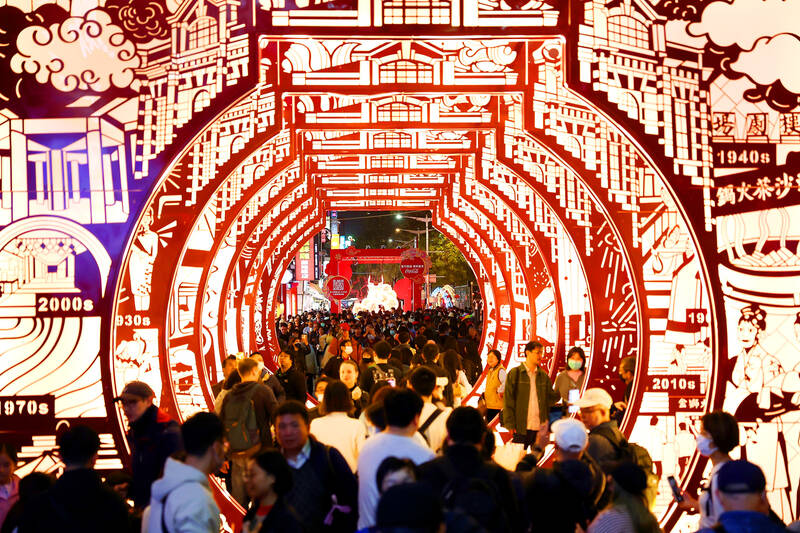South Korean visitors last year surpassed tourists from China, Hong Kong and Macau as the top daily tourist spenders in Taiwan, a survey released yesterday by the Tourism Administration showed.
The aggregate expenditure of international visitors in Taiwan topped US$8.661 billion last year, 60 percent of 2019 amount.
Last year, the average daily amount spent by tourists was down 7.78 percent from 2019 at US$180.67, the survey showed.

Photo: CNA
South Koreans ranked first in average daily spending at US$212.14, followed by US$197.62 among Japanese and US$197.33 among US visitors, it showed.
South Korean tourists spent about US$44.96 per day, compared with US$37.20 spent by Chinese and US$36.17 by tourists from Hong Kong or Macau, it showed.
Japanese tourists preferred Taiwanese tea, while tourists from South Korea, Europe and North America tended to purchase more souvenirs and handicrafts, it showed.
Those from China, Hong Kong and countries targeted by the government’s New Southbound Policy prefered clothing and accessories, it showed.
The number of Japanese visitors and their daily spending declined significantly last year due to a devaluation of the yen and global inflation, the survey showed.
The nation welcomed 928,000 Japanese tourists last year, 42 percent of the level in 2019, before the COVID-19 pandemic, it showed.
Their average daily spending was down nearly 14 percent compared with 2019, the survey showed.
Collectively, they contributed about US$1 billion to the nation’s tourism revenue, it showed.
By contrast, 37 percent of international visitors were from countries targeted by the New Southbound Policy, including Vietnam, the Philippines and Thailand, due to streamlined visa application procedures and other incentives, it showed.
Policy countries have emerged as the largest source of international tourists in the post-pandemic era, it showed.
Visitors in the post-pandemic era are often influenced by social media or through word of mouth, it showed.
Most international visitors tend to decide to travel within a short period and prefer to travel independently with greater flexibility, the survey showed.
International tourists favored attractions in Taiwan’s north, the survey showed.
Overall, average daily spending among international visitors, including accommodation, food and shopping, decreased compared with 2019, but the average number of days they stayed was greater than that before the pandemic — 7.39 nights compared with 6.2 nights in 2019 — the survey showed.
Nearly 90 percent of tourists traveled to Taiwan independently, up 6.5 percent from 2019, the survey showed.
On average, tourists started planning for trips to Taiwan about 29 days in advance, down from 52 days in 2019, it showed.
The most popular tourist attractions were night markets, Taipei 101, Ximending (西門町) and Jiufen (九份), the same as in 2019, it showed.
Fifty percent of respondents said that they had visited Taiwan previously.
Their favorite activities in Taiwan were shopping, and visiting night markets and historic sites, and they were deeply impressed by the food and snacks, they said.
The top three scenic spots were Sun Moon Lake, Pingsi District (平溪) in New Taipei City and Jiufen, they said.
They rated highly the friendliness of locals, the convenience of public transport, the low crime rate and safe travel environment.

TRAFFIC SAFETY RULES: A positive result in a drug test would result in a two-year license suspension for the driver and vehicle, and a fine of up to NT$180,000 The Ministry of Transportation and Communications is to authorize police to conduct roadside saliva tests by the end of the year to deter people from driving while under the influence of narcotics, it said yesterday. The ministry last month unveiled a draft of amended regulations governing traffic safety rules and penalties, which included provisions empowering police to conduct mandatory saliva tests on drivers. While currently rules authorize police to use oral fluid testing kits for signs of drug use, they do not establish penalties for noncompliance or operating procedures for officers to follow, the ministry said. The proposed changes to the regulations require

Taipei, New Taipei City, Keelung and Taoyuan would issue a decision at 8pm on whether to cancel work and school tomorrow due to forecasted heavy rain, Keelung Mayor Hsieh Kuo-liang (謝國樑) said today. Hsieh told reporters that absent some pressing reason, the four northern cities would announce the decision jointly at 8pm. Keelung is expected to receive between 300mm and 490mm of rain in the period from 2pm today through 2pm tomorrow, Central Weather Administration data showed. Keelung City Government regulations stipulate that school and work can be canceled if rain totals in mountainous or low-elevation areas are forecast to exceed 350mm in

1.4nm WAFERS: While TSMC is gearing up to expand its overseas production, it would also continue to invest in Taiwan, company chairman and CEO C.C. Wei said Taiwan Semiconductor Manufacturing Co (TSMC) has applied for permission to construct a new plant in the Central Taiwan Science Park (中部科學園區), which it would use for the production of new high-speed wafers, the National Science and Technology Council said yesterday. The council, which supervises three major science parks in Taiwan, confirmed that the Central Taiwan Science Park Bureau had received an application on Friday from TSMC, the world’s largest contract chipmaker, to commence work on the new A14 fab. A14 technology, a 1.4 nanometer (nm) process, is designed to drive artificial intelligence transformation by enabling faster computing and greater power

China Airlines Ltd (CAL) yesterday morning joined SkyTeam’s Aviation Challenge for the fourth time, operating a demonstration flight for “net zero carbon emissions” from Taiwan Taoyuan International Airport to Bangkok. The flight used sustainable aviation fuel (SAF) at a ratio of up to 40 percent, the highest proportion CAL has achieved to date, the nation’s largest carrier said. Since April, SAF has become available to Taiwanese international carriers at Taipei International Airport (Songshan airport), Kaohsiung International Airport and Taoyuan airport. In previous challenges, CAL operated “net zero carbon emission flights” to Singapore and Japan. At a ceremony at Taoyuan airport, China Airlines chief sustainability